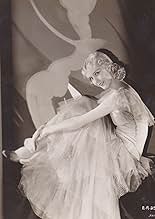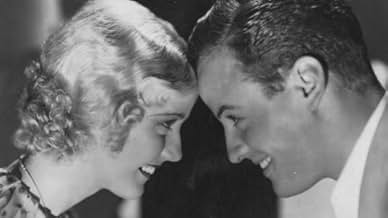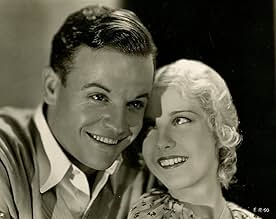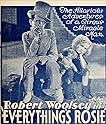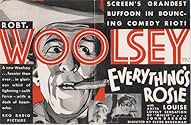A carnival huckster and his 17-year-old foster daughter try to be accepted by the townspeople when she and a handsome lad fall in love.A carnival huckster and his 17-year-old foster daughter try to be accepted by the townspeople when she and a handsome lad fall in love.A carnival huckster and his 17-year-old foster daughter try to be accepted by the townspeople when she and a handsome lad fall in love.
Alf James
- Al Oberdorf - Jeweler
- (as Alfred James)
Buster Brodie
- Little Bald Man at Auction
- (uncredited)
Nora Cecil
- Hotel Proprietress
- (uncredited)
George Chandler
- Jail Guard
- (uncredited)
Frank Darien
- Sam Hall
- (uncredited)
Charles Gillette
- Man
- (uncredited)
William Halligan
- Dr. Powers- Medicine Barker
- (uncredited)
Rochelle Hudson
- Lowe Party Guest by Punch Bowl
- (uncredited)
Arline Judge
- Guest at the Lowe party
- (uncredited)
Charles Meakin
- Lowe Party Guest
- (uncredited)
Featured reviews
1931's "Everything's Rosie" was the result of RKO's attempt to split the team of Bert Wheeler and Robert Woolsey (after six successful comedies together), in the mistaken belief that the duo would bring in twice the revenue by working in separate films. Wheeler's picture, "Too Many Cooks" (issued AFTER Woolsey's by the way), had just been completed when Woolsey began shooting his own, a story that has been described as a ripoff of W. C. Fields's stage hit "Poppy," previously made as the silent "Sally of the Sawdust," but not remade until 1936 (interestingly, Woolsey was a co-star in the Broadway version). Director Clyde Bruckman became notorious for borrowing other people's material, having worked with the likes of Buster Keaton and Harold Lloyd. What has never been discussed is the fact that "Rosie" also looks forward to such W. C. Fields titles as "You Can't Cheat an Honest Man," where Fields hilariously takes on high society. Cast as J. Dockweiler Droop ('Doc' for short), Woolsey is a carnival huckster revealed to have a heart of gold, adopting a three year old girl named Rosie who attaches herself to him. Growing into lovely adulthood (Anita Louise, breathtaking at 16), Rosie wants to move on from their wandering lifestyle and marry a wealthy young man who falls for her after splashing the girl with mud. 'Doc' name drops uncles all over the world, and the socialites always eat it up, even falling for the old shell game. There's really no part for Bert Wheeler in this film, and Woolsey is quite funny in his asides with suckers, not in the same league as Fields, but able to hold his own. Among the familiar faces are Noah Young (Harold Lloyd), Leo Willis (Laurel and Hardy), Frank Darien (Charlie Chase), and three performers who later worked with W. C. Fields himself- Nora Cecil ("You're Telling Me," "The Old Fashioned Way"), George Chandler ("The Fatal Glass of Beer"), and 15 year old Rochelle Hudson, "Poppy" herself, in only her second feature film (among the party guests). The experiment having failed, RKO quickly reunited Wheeler and Woolsey, who went on to do an additional 14 more features for the studio, only ending with Woolsey's untimely death in 1938.
It seems to me that this forgotten 1931 grade-B comedy starring Robert Woolsey who we lost too soon in some aspects may have inspired W C Fields' 1934 The Old Fashioned Way!
The review by kevinolzak for "Everything's Rosie" is a very good one as it points out correctly that this film is essentially a rip-off of a W.C. Fields play which was later brought to the screen as "Poppy". So, if you've seen "Poppy", you'll know what to expect in "Everything's Rosie". I am sure RKO claimed it was all a coincidence but the films clearly are nearly the same story.
When the story begins, Dr. Droop (Robert Woolsey) is a carny and spends much of his time separating folks from their money. However, there is a hidden decency about the man and so when he meets a tiny orphan, he takes her in and raises her as his own. The film soon skips ahead 15 years and this step-daughter is his assistant as they drift about the country going from carnival to carnival. This life is disrupted when she meets a nice guy and naturally she wants to settle down with him.
In so many ways, this film is similar to "Poppy" and while I think W.C. Fields was the best suited for the lead, Robert Woolsey was actually a very good substitute and was definitely in his element in the film. Anita Louise, who played his daughter, was fine...though VERY young when you consider that the film is about her possibly getting married....and she's only 15 in real life. Overall, it's a rather sweet story...well worth seeing....and it would make a great double-feature being shown along side the Fields film.
When the story begins, Dr. Droop (Robert Woolsey) is a carny and spends much of his time separating folks from their money. However, there is a hidden decency about the man and so when he meets a tiny orphan, he takes her in and raises her as his own. The film soon skips ahead 15 years and this step-daughter is his assistant as they drift about the country going from carnival to carnival. This life is disrupted when she meets a nice guy and naturally she wants to settle down with him.
In so many ways, this film is similar to "Poppy" and while I think W.C. Fields was the best suited for the lead, Robert Woolsey was actually a very good substitute and was definitely in his element in the film. Anita Louise, who played his daughter, was fine...though VERY young when you consider that the film is about her possibly getting married....and she's only 15 in real life. Overall, it's a rather sweet story...well worth seeing....and it would make a great double-feature being shown along side the Fields film.
"Everything's Rosie" is Robert Woolsey's only (surviving) film without the presence of his comedy partner, Bert Wheeler. It is a respectable effort with Woolsey playing a carnival con-man and his adopted daughter trying to fit in with the high society of a small town. This film has many laughs, but the primary difference between this and the other Wheeler/Woolsey films is that it is not afraid to stick dramatic moments into the comedy as well as treating the characters played by Woolsey and Anita Louise as real people instead of slapstick/cartoon characters. I generally liked this movie (being a fan of Wheeler & Woolsey, I usually like all their movies). However, Woolsey's abrasive comic personality is sometimes hard to take for a long period of time, even in this 67 minute film. This film would have worked a lot better had he been able to vent his jokes onto a comic foil, a role which Wheeler usually would have played. The video I have this movie on was taped off of Turner Classic Movies several years ago and features clear sound and very clear picture quality.
The comedy team of Wheeler and Woolsey are one of my guilty pleasures: I enjoy their films, but I'm aware that much of their material isn't very good. Part of the problem is that W&W's gag writers were working concurrently for the Marx Brothers, and the Marxes always got first pick of their best material, lumbering Wheeler & Woolsey with whatever was left.
Although Robert Woolsey was the more aggressively 'comic' of the pair, there is general agreement that Bert Wheeler not precisely a 'straight man' feed was the more talented of the duo. Wheeler and Woolsey often remind me of Morecambe and Wise, with bespectacled Woolsey as Eric and earnest little Wheeler as Ernie. In both cases, the team were largely dependent on their (highly variable) material.
'Everything's Rosie' is a very slight change of pace, as Woolsey for once carries a film without Bert Wheeler ... and this proves to be a bad idea, as the aggressive pace of Woolsey is wearying without the sympathetic contrast of the naff and gormless Wheeler for him to play against. Robert Woolsey reminds me of a lot of other comedians Groucho Marx, Bobby Clark, WC Fields, Eric Morecambe, Phil Silvers but, in every case, Woolsey is the one who comes off second-best in the comparison.
Here, Woolsey is lumbered with a plot that's a blatant rip-off of WC Field's stage play 'Poppy', which Fields had already filmed as (the silent) 'Sally of the Sawdust'. Woolsey plays a carnival huckster, a patent-medicine butcher with the very Fieldsian name J. Dockweiler Droop. His daughter Rosie (the beautiful Anita Louise) is too delicate for the harsh life of a travelling carny; she wants to marry a handsome young man and settle down. The script is careful to stipulate that Rosie is Droop's adopted foundling, not his blood child: I suppose that audiences might have been offended by the notion of this dainty girl springing from the loins of Robert Woolsey.
The funniest line in the movie occurs following the explanation that Rosie got her name because she was found beneath a rose bush, prompting Woolsey to jape 'It's lucky she wasn't found under a eucalyptus tree.' 'Everything's Rosie' disappeared so thoroughly after its release that WC Fields was able to film his own version of this story, 'Poppy' (a remake of 'Sally of the Sawdust'), five years later. Although 'Poppy' is of vital historic importance to Fields's career, as the only sound-era version of his stage play, 'Poppy' is one of Fields's worst films: he was in poor health during its production, and in many sequences he is very obviously doubled. Nonetheless, I found 'Poppy' far more enjoyable than 'Everything's Rosie'. I'll rate this rip-off version 6 out of 10, purely on Woolsey's sheer ebullience and Anita Louise's delicately beautiful looks.
Although Robert Woolsey was the more aggressively 'comic' of the pair, there is general agreement that Bert Wheeler not precisely a 'straight man' feed was the more talented of the duo. Wheeler and Woolsey often remind me of Morecambe and Wise, with bespectacled Woolsey as Eric and earnest little Wheeler as Ernie. In both cases, the team were largely dependent on their (highly variable) material.
'Everything's Rosie' is a very slight change of pace, as Woolsey for once carries a film without Bert Wheeler ... and this proves to be a bad idea, as the aggressive pace of Woolsey is wearying without the sympathetic contrast of the naff and gormless Wheeler for him to play against. Robert Woolsey reminds me of a lot of other comedians Groucho Marx, Bobby Clark, WC Fields, Eric Morecambe, Phil Silvers but, in every case, Woolsey is the one who comes off second-best in the comparison.
Here, Woolsey is lumbered with a plot that's a blatant rip-off of WC Field's stage play 'Poppy', which Fields had already filmed as (the silent) 'Sally of the Sawdust'. Woolsey plays a carnival huckster, a patent-medicine butcher with the very Fieldsian name J. Dockweiler Droop. His daughter Rosie (the beautiful Anita Louise) is too delicate for the harsh life of a travelling carny; she wants to marry a handsome young man and settle down. The script is careful to stipulate that Rosie is Droop's adopted foundling, not his blood child: I suppose that audiences might have been offended by the notion of this dainty girl springing from the loins of Robert Woolsey.
The funniest line in the movie occurs following the explanation that Rosie got her name because she was found beneath a rose bush, prompting Woolsey to jape 'It's lucky she wasn't found under a eucalyptus tree.' 'Everything's Rosie' disappeared so thoroughly after its release that WC Fields was able to film his own version of this story, 'Poppy' (a remake of 'Sally of the Sawdust'), five years later. Although 'Poppy' is of vital historic importance to Fields's career, as the only sound-era version of his stage play, 'Poppy' is one of Fields's worst films: he was in poor health during its production, and in many sequences he is very obviously doubled. Nonetheless, I found 'Poppy' far more enjoyable than 'Everything's Rosie'. I'll rate this rip-off version 6 out of 10, purely on Woolsey's sheer ebullience and Anita Louise's delicately beautiful looks.
Did you know
- TriviaRobert Woolsey's only starring feature without Bert Wheeler. They were a popular comedy team at the time and the studio tried to capitalize on that by splitting them up to star in their own films. Wheeler's solo film was Too Many Cooks (1931). With the disappointing results from both films, these would be their only solo efforts until Woolsey's passing in 1938.
- Crazy creditsWith Anita Louise, lovely sensation of "Millie".
Details
Box office
- Budget
- $140,000 (estimated)
- Runtime
- 1h 7m(67 min)
- Color
Contribute to this page
Suggest an edit or add missing content

